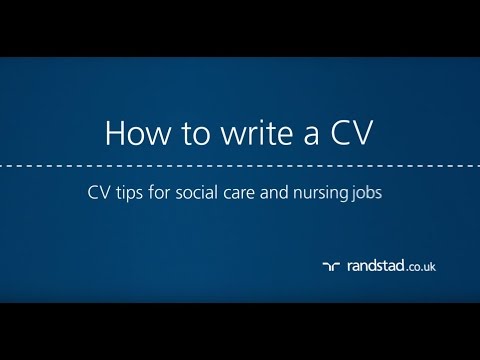Before applying for a job as a healthcare assistant or care assistant, create an exceptional CV that sells you to a prospective employer.
Jobs in the care sector are highly competitive, so ensure that your application stands out and highlights you as the perfect candidate for the position. Once you've been hired, you might like to think long-term about your career as a care assistant.
how to create the perfect healthcare assistant CV?
Your CV should be carefully planned, presented neatly in a clear standard font, around size 12. It should not contain any spelling or grammatical errors, so use a spell check or get someone to proofread it.
You might be the perfect person for the job, but if your CV does not emphasise this to a potential employer then you run the risk of your application not getting any further.
There are no hard and fast rules, but lay the CV out in sections, like:
- contact details
- outline your name, address, email address and contact telephone number.
- profile
Just give a couple of lines or a paragraph summing up your qualities. This section shows the employer a little about you and your personality; so keep it interesting, but concise.
The role of a care assistant or care worker will require you to be hard working, compassionate and dedicated – so outline this at the beginning of your CV.
Think of any other relevant qualities you have, such as your ability to interact with people, or your desire to help others. Give a brief outline of the role you are currently working in and any career goals you have.
employment history.
Put this underneath your profile and list previous roles and companies you have worked in, with dates. Start with your most recent work, and keep paid employment and voluntary work in separate sections.
Briefly list your typical duties and responsibilities for each job. If you are applying for the position of a care assistant, talk about the clients you looked after, their age range and specific needs and requirements.
Talk about any organisations that you had to deal with like social services or district nurses, for example, and remember to highlight any admin work you did, like keeping records and tracking progress.
Explain any gaps. It’s better to say you were ‘job-seeking’ or bringing up your children than leave them to worry that you were in prison.
education.
Briefly list your secondary school and further or higher education only! List your qualifications – and grades if they are good.
training & skills.
Include any relevant training or qualifications such as first aid or CPR that enhance your application and help it to stand out amongst others. Remember to state if you have a full, clean driving licence, or speak any additional languages.
Our recruiters in the care sector outline their top CV writing tips here:
<h3>Additional experience.</h3>
<p>If you have worked voluntarily it shows a potential employer that you are serious and dedicated to this line of work and volunteering without payment emphasises your passion.</p>
<p>If you spent a couple of weeks helping out in a local school listening to children read, even if it’s not directly related to the job you are applying for, it shows that you are a compassionate and caring person committed to helping others.</p>
<h3>Interests.</h3>
<p>You could also add a section on interests – add things that might be useful in the work setting or for the service user group. For example, singing or music could be valuable in a residential home for elderly people.</p>
<p>Cookery, craft, arts or gardening could help you to bond with people or support activities.</p>
<h3>Referees.</h3>
<p>Give the names, roles and contact details of a couple of people who can describe your ability to do the job; or your integrity and caring nature. One should usually be your last employer.</p>
<p>Finally, take time to ensure that it shows you off to the best of your ability. Talk about yourself positively and show the employer that you have exactly the skills, abilities and experience they are looking for. But don’t ramble. Bullet points can keep you focused.</p>
<p>Keep your CV as tight as possible. Depending on your career, length can vary, but try to keep it to a couple of pages.</p>
<p>Modify your CV to suit each job, and customise it for the role you are applying for. You might want to emphasise particular skills, experience or client groups that match the job you’re going for, so feel free to shift the emphasis, and make other areas brief.</p>
<p>Tell them how you meet the person specification or match the job description, exactly!</p>






